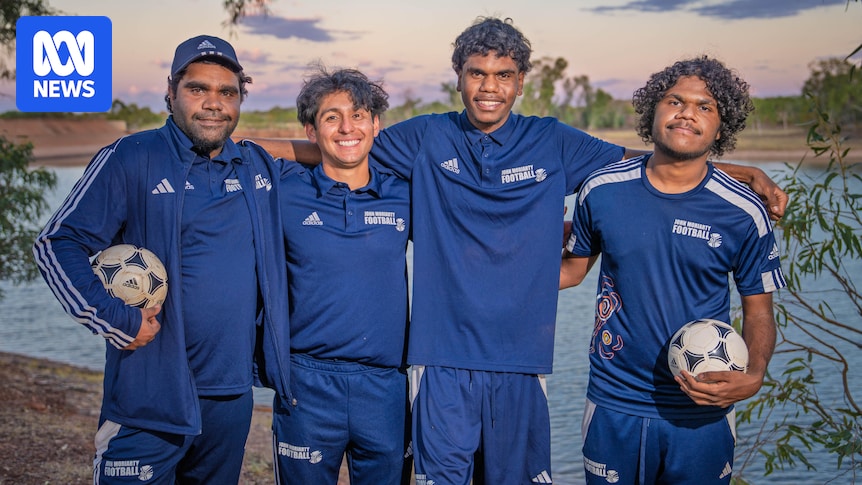
Nearly 1,000 kilometers south of Darwin on the Stuart Highway, the remote town of Tennant Creek is alive with the sounds of children playing, momentarily drowned out by the rumble of a passing road train. At Tennant Creek Primary School, the oval is a vibrant scene of yellow and blue tunics, as students eagerly participate in a soccer session. “What a save, what a save!” shouts head coach Abraham Miranda, capturing the enthusiasm of John Moriarty Football Day.
Every Wednesday, students leave their classrooms to engage in the John Moriarty Foundation (JMF) football program, named after the trailblazing Aboriginal soccer star, John Moriarty. This initiative is not just about learning soccer skills; as Miranda explains, “Those core values, we want to encourage them, not just on the football field, but in life. So when hardship arrives in life, they remember those core values.”
The Legacy of John Moriarty
The program honors John Moriarty, a Yanyuwa man and the first Aboriginal player selected to represent Australia in football. Born in Borroloola in 1938, Moriarty’s life was profoundly impacted by being taken from his family at age four as part of the Stolen Generations. Despite a career-ending injury that prevented him from playing for the Socceroos, Moriarty’s passion for football changed his life, offering him a sense of belonging and equality through the sport’s cultural diversity.
Moriarty’s vision for the program is clear: “JMF has the capacity to transform lives by creating ripples of change that start with ‘a child, a football, a dream’ and flow outwards to impact families, communities, and the nation, creating opportunity and unlocking potential,” he says.
Pathways to Success
Among the 5,000 children participating annually across 18 remote and regional communities is nine-year-old Nikolias Hayes. “I learned about passing and kicking goals and sharing the ball,” he shares. Hayes could potentially follow the path of Shadeene Evans from Borroloola, who joined the program’s pilot in 2012 and later played for the Young Matildas and Central Coast Mariners.
However, the program’s focus extends beyond discovering future soccer stars. It’s about fostering positive community change. Warunmungu teenagers Ethan Holt and Waikean Kelly, now community coaches, were among the first students when the program launched in Tennant Creek. Kelly, who began a school-based apprenticeship with JMF in 2023, reflects on his journey: “I go to school two days a week and the rest of the days go to work.”
Integrating Culture and Education
Before soccer sessions, the focus shifts to language and learning under the shade of a tree in Tingkkarli, outside Tennant Creek. Here, JMF’s playgroup for children under five, Indi Kindi, takes place. Traditional owners and Warumungu sisters, Nadia Foster-Graham and Anthea Graham, lead the sessions, teaching children in their native language and sharing cultural knowledge.
“She could be telling you what that animal is, the common name of it, the scientific name of it, and then she also says it in language which I think is pretty amazing,” says team leader Keara Baker-Storrey, emphasizing the program’s cultural significance.
Community-Driven Governance and Impact
Initiated in 2012 at the request of senior Aboriginal law women in Borroloola, JMF’s program now operates from four hubs—Borroloola, Cairns, Dubbo, and Tennant Creek—reaching out to surrounding homelands. Regular community consultations ensure the program remains aligned with local needs and values. “The community comes together to make the guidelines,” explains JMF executive general manager Chris Andrew. “We are here to be invited in and provide opportunity.”
Earlier this year, a Deloitte report commissioned by JMF highlighted the program’s impact on 10 of the national Closing the Gap targets, including health, education, wellbeing, and employment. With the cost of detaining a young person at $3,600 per day, the program’s annual cost of $1,300 per child offers a compelling alternative. “You can put 1,000 young people on a football pitch for the same amount of money,” Andrew notes.
The federal government’s $5.5 million grant to JMF this year underscores the program’s significance and potential. As community coaches attest, participation is enthusiastic and widespread. “They love it,” they say, reflecting the program’s enduring impact on young lives and communities.







